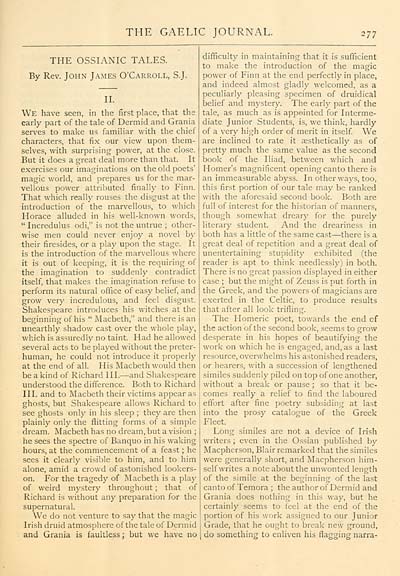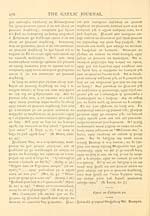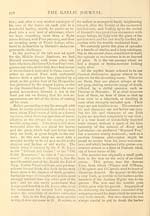Blair Collection > Gaelic journal > Volume 1, number 1
(291)
Download files
Complete book:
Individual page:
Thumbnail gallery: Grid view | List view

THE GAELIC JOURNAL.
277
THE OSSIANIC TALES.
By Rev. JOHN James O'Carroll, S.J.
II.
We have seen, in the first place, that the
early part of the tale of Dermid and Grania
serves to make us familiar with the chief
characters, that fix our view upon them-
selves, with surprising power, at the close.
But it does a great deal more than that. It
exercises our imaginations on the old poets'
magic world, and prepares us for the mar-
vellous power attributed finally to Finn.
That which really rouses the disgust at the
introduction of the marvellous, to which
Horace alluded in his well-known words,
" Incredulus odi," is not the untrue ; other-
wise men could never enjoy a novel by
their firesides, or a play upon the stage. It
is the introduction of the marvellous where
it is out of keeping, it is the requiring of
the imagination to suddenly contradict
itself, that makes the imagination refuse to
perform its natural office of easy belief, and
grow very incredulous, and feel disgust.
Shakespeare introduces his witches at the
beginning of his " Macbeth," and there is an
unearthly shadow cast over the whole play,
which is assuredly no taint. Had he allowed
several acts to be played without the preter-
human, he could not introduce it properly
at the end of all. His Macbeth would then
be a kind of Richard III. — and Shakespeare
understood the difference. Both to Richard
III. and to Macbeth their victims appear as
ghosts, but Shakespeare allows Richard to
see ghosts only in his sleep ; they are then
plainly only the flitting forms of a simple
dream. Macbeth has no dream, but a vision ;
he sees the spectre of Banquo in his waking
hours, at the commencement of a feast ; he
sees it clearly visible to him, and to him
alone, amid a crowd of astonished lookers-
on. For the tragedy of Macbeth is a pla}?
of weird mystery throughout ; that of
Richard is without any preparation for the
supernatural.
We do not venture to say that the magic
Irish druid atmosphere of the tale of Dermid
and Grania is faultless; but we have no
difficulty in maintaining that it is sufficient
to make the introduction of the magic
power of Finn at the end perfectly in place,
and indeed almost gladly welcomed, as a
peculiarly pleasing specimen of druidical
belief and mystery. The early part of the
tale, as much as is appointed for Interme-
diate Junior Students, is, we think, hardly
of a very high order of merit in itself. We
are inclined to rate it aesthetically as of
pretty much the same value as the second
book of the Iliad, between which and
Homer's magnificent opening canto there is
an immeasurable abyss. In other ways, too,
this first portion of our tale may be ranked
with the aforesaid second book. Both are
full of interest for the historian of manners,
though somewhat dreary for the purely
literary student. And the dreariness in
both has a little of the same cast — there is a
great deal of repetition and a great deal of
unentertaining stupidity exhibited (the
reader is apt to think needlessly) in both.
There is no great passion displayed in either
case ; but the might of Zeuss is put forth in
the Greek, and the powers of magicians are
exerted in the Celtic, to produce results
that after all look trifling.
The Homeric poet, towards the end cf
the action of the second book, seems to grow
desperate in his hopes of beautifying the
work on which he is engaged, and, as a last
resource, overwhelms his astonished readers,
or hearers, with a succession of lengthened
similes suddenly piled on top of one another,
without a break or pause ; so that it be-
comes really a relief to find the laboured
effort after fine poetry subsiding at last
into the prosy catalogue of the Greek
Fleet.
Long similes are not a device of Irish
writers ; even in the Ossian published by
Macpherson, Blair remarked that the similes
were generally short, and Macpherson him-
self writes a note about the unwonted length
of the simile at the beginning of the last
canto of Temora ; the author of Dermid and
Grania does nothing in this way, but he
certainly seems to feel at the end of the
portion of his work assigned to our Junior
Grade, that he ought to break new ground,
do something to enliven his flagging nafra-
277
THE OSSIANIC TALES.
By Rev. JOHN James O'Carroll, S.J.
II.
We have seen, in the first place, that the
early part of the tale of Dermid and Grania
serves to make us familiar with the chief
characters, that fix our view upon them-
selves, with surprising power, at the close.
But it does a great deal more than that. It
exercises our imaginations on the old poets'
magic world, and prepares us for the mar-
vellous power attributed finally to Finn.
That which really rouses the disgust at the
introduction of the marvellous, to which
Horace alluded in his well-known words,
" Incredulus odi," is not the untrue ; other-
wise men could never enjoy a novel by
their firesides, or a play upon the stage. It
is the introduction of the marvellous where
it is out of keeping, it is the requiring of
the imagination to suddenly contradict
itself, that makes the imagination refuse to
perform its natural office of easy belief, and
grow very incredulous, and feel disgust.
Shakespeare introduces his witches at the
beginning of his " Macbeth," and there is an
unearthly shadow cast over the whole play,
which is assuredly no taint. Had he allowed
several acts to be played without the preter-
human, he could not introduce it properly
at the end of all. His Macbeth would then
be a kind of Richard III. — and Shakespeare
understood the difference. Both to Richard
III. and to Macbeth their victims appear as
ghosts, but Shakespeare allows Richard to
see ghosts only in his sleep ; they are then
plainly only the flitting forms of a simple
dream. Macbeth has no dream, but a vision ;
he sees the spectre of Banquo in his waking
hours, at the commencement of a feast ; he
sees it clearly visible to him, and to him
alone, amid a crowd of astonished lookers-
on. For the tragedy of Macbeth is a pla}?
of weird mystery throughout ; that of
Richard is without any preparation for the
supernatural.
We do not venture to say that the magic
Irish druid atmosphere of the tale of Dermid
and Grania is faultless; but we have no
difficulty in maintaining that it is sufficient
to make the introduction of the magic
power of Finn at the end perfectly in place,
and indeed almost gladly welcomed, as a
peculiarly pleasing specimen of druidical
belief and mystery. The early part of the
tale, as much as is appointed for Interme-
diate Junior Students, is, we think, hardly
of a very high order of merit in itself. We
are inclined to rate it aesthetically as of
pretty much the same value as the second
book of the Iliad, between which and
Homer's magnificent opening canto there is
an immeasurable abyss. In other ways, too,
this first portion of our tale may be ranked
with the aforesaid second book. Both are
full of interest for the historian of manners,
though somewhat dreary for the purely
literary student. And the dreariness in
both has a little of the same cast — there is a
great deal of repetition and a great deal of
unentertaining stupidity exhibited (the
reader is apt to think needlessly) in both.
There is no great passion displayed in either
case ; but the might of Zeuss is put forth in
the Greek, and the powers of magicians are
exerted in the Celtic, to produce results
that after all look trifling.
The Homeric poet, towards the end cf
the action of the second book, seems to grow
desperate in his hopes of beautifying the
work on which he is engaged, and, as a last
resource, overwhelms his astonished readers,
or hearers, with a succession of lengthened
similes suddenly piled on top of one another,
without a break or pause ; so that it be-
comes really a relief to find the laboured
effort after fine poetry subsiding at last
into the prosy catalogue of the Greek
Fleet.
Long similes are not a device of Irish
writers ; even in the Ossian published by
Macpherson, Blair remarked that the similes
were generally short, and Macpherson him-
self writes a note about the unwonted length
of the simile at the beginning of the last
canto of Temora ; the author of Dermid and
Grania does nothing in this way, but he
certainly seems to feel at the end of the
portion of his work assigned to our Junior
Grade, that he ought to break new ground,
do something to enliven his flagging nafra-
Set display mode to: Large image | Transcription
Images and transcriptions on this page, including medium image downloads, may be used under the Creative Commons Attribution 4.0 International Licence unless otherwise stated. ![]()
| Early Gaelic Book Collections > Blair Collection > Gaelic journal > Volume 1, number 1 > (291) |
|---|
| Permanent URL | https://digital.nls.uk/79316408 |
|---|
| Description | No. 1, Vol. I. November, 1882. |
|---|---|
| Shelfmark | Blair.214 |
| Additional NLS resources: | |
| Attribution and copyright: |
|
| Description | A selection of books from a collection of more than 500 titles, mostly on religious and literary topics. Also includes some material dealing with other Celtic languages and societies. Collection created towards the end of the 19th century by Lady Evelyn Stewart Murray. |
|---|
| Description | Selected items from five 'Special and Named Printed Collections'. Includes books in Gaelic and other Celtic languages, works about the Gaels, their languages, literature, culture and history. |
|---|

